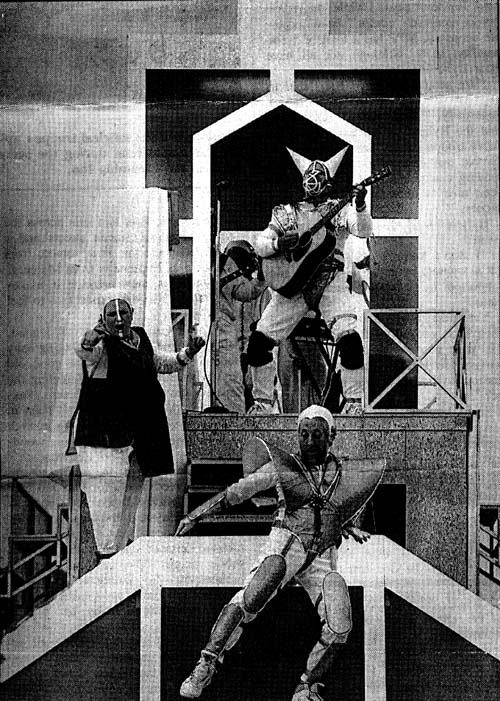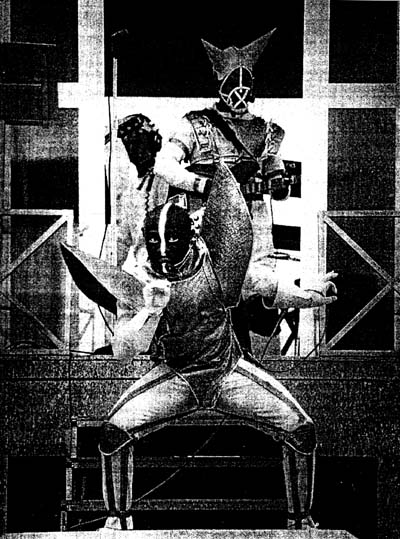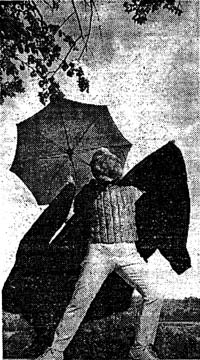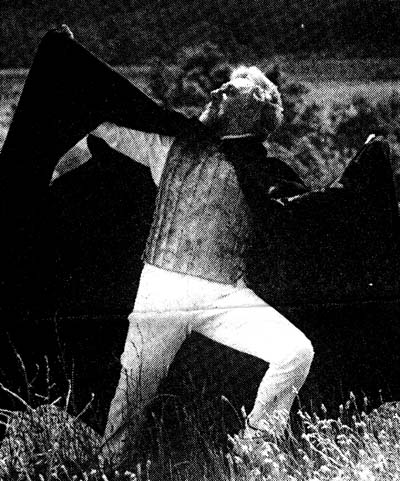Shakespeare on Wheels
The Tempest
Press Coverage
Pump down the volume!
|
With its youthful cast and noisy outdoor venues, UMBC's Shakespeare on Wheels almost inevitably does best with the low-comedy clown scenes in the Shakespeare plays it tackles. This summer's roving production of "The Tempest" is no different.When Stephano and Trinculo, the hot-aired butler and bumbling jester, get drunk with Caliban, the not-so- noble savage on the island where the shipwrecked two have landed, the results provide the brightest sparks in the show - which received two performances locally on the campus of Howard Community College last week-end.. The physical slapstick and Elizabethan jokes proved broad enough to grab everyone in the crowd - from restless kids to skeptical Shakespeare fans. Director Sam McCready and his student cast are less successful, though, with the more serious sections of "The Tempest": the encounter between the exiled Prospero and his former enemies from Milan; the romance between the sheltered Miranda and the princely Ferdinand; - the tense relations between Prospero and his island subjects. McCready's attempts to make the "difficult" parts of Shakespeare more palatable to his lawn-chair audience backfire in nearly every instance. This production's most obvious bid for the popular imagination was in its adaptation of certain passages from "The Tempest" into rock songs. Even someone as sympathetic to rock'n'roll as this reviewer could tell this was a bad idea. Good rock songs require the blunt, forceful language of urban America - a dialect diametrically opposed to 16th-century feudal English. In any case, it would have been a miracle if someone from UMBC had come up with rock music good enough to match the art of Shakespeare's words, and that miracle didn't happen. UMBC alumnus Carl Freundel and his brother Steve not only composed the 24-song score but they are also two of the four musicians who play it every night. The fruit of their labor isn't as wincingly awful as many rock musicals, but the songs do tend to be blandly derivative. There's a generic blues tune, for instance, a generic soft- rock love song and a generic doo-wop number. When the Freundel brothers try to paraphrase Shakespeare, as in "Mean Caliban-Man Blues," the artlessness of the wording contrasts sharply with the Shakespearean dialogue. When the brothers try to set their music to Shakespeare's intact verse, as in Pros- pero's "The Story of My Life," the musical convolutions lead to some very awkward phrasing. To pump out the guitars, keyboards and vocals of the songs, Shakespeare on Wheels has purchased a new sound system. Unfortunately, the troupe hasn't quite gotten the hang of the technology yet, and every time a character shouts or wails, the speakers spit out piercing distortion. (A colleague dubbed the production "Shakespeare on Squeals.") | If the UMBC theater department can gain control of the sound system, however, it could become a valuable asset, for hard-to-decipher dialogue is much less of a problem this year than in past productions. Moreover, the music is often quite effective when used as background scoring rather than as foreground songs. UMBC would be wise to use purely instrumental music in future productions as a way of establishing and sustaining moods in their outdoor venues.Another of director McCready's gimmicks is to present Prospero's island as a sort of Star Trek spaceship. The truck-mounted stage is shaped like a Moorish mosque, complete with dome, but the silver-and-white design (not to mention the antenna sticking up from the dome) give it a sci-fi feel. This is reinforced by designer Elena Zlotescu's silver-and-white fantasy costuming for the island residents. By contrast, the shipwrecked travelers from Italy wear lavish Elizabethan costumes with lots of lace, velvet and bustles. This is all very eye-catching, but its unclear how it relates to the play's themes. That's because the play's themes fall victim to another of McCready's accessibility gambits: his ruthless editing of the text to get the playing time under two-and-a-half hours. The effort succeeds, but often at the cost of Shakespeare's poetry and philosophy; all that's left is the plotting. McCready and Carl Freundel are not only the director and composer for the production, but they also play the parts of Prospero and Caliban, respectively. Both prove fine actors but mediocre singers. McCready brings a certain smugness to Prospero's machinations and thus brings out both the arrogance and authority of this ambiguous character. As the island's indigenous monster, Freundel does as much with Caliban's body language as with his spoken_lines and his crawling, grunting, slithering interpretation works in both the comic and serious scenes. Nguyen Tucker radiates Miranda's girlish infatuation so clearly that it's easy to believe. By contrast, Thomas P. Cloherty makes for a very handsome but rather boring Ferdinand. James Brown-Orleans' quick, darting movements and excited chatter make Ariel the sprite seem very airy indeed, and Chris Colussi does a nice turn as the greedy and scheming Antonia. The production's best performance, though, comes from Michael P. Hoffmaster, who plays the drunken, boisterous Stephano as if he were Falstaff. 'The round-bellied Hoffmaster belts out the Freundels' songs like pub sing-alongs and bellows his intention to become king of the island. It's very funny stuff, the kind of Shakespearean burlesque that UMBC should emphasize more. UMBC's Shakespeare on Wheels production of "The Tempest" will be performed at the locations listed below. All shows are free and open to the public, and curtain time is 7:30 .p.m. unless otherwise noted. ..dates omited Geoffrey Himes THE COLUMBIA FLIER July 11, 1991 |

Sam McCready, front and center, both directs and stars as Prospero in
an original, sci-fi rock-musical version of "The Tempest," this year's
traveling Shakespeare on Wheels production, coming to various local
sites through Sept. 7.
| |
Backstage
By Pamela Sommers
Okay. You've seen Shakespeare for free at Carter Barron (Shakespeare Theatre at the Folger's "Merry Wives of Windsor"), from the loftlike penthouse level of a Baliston skyscraper (Washington Shakespeare Company's "Julius Caesar") and maybe even in Central Park. But have you ever seen the Bard's work come to life via a passel of vagabond players, performing on an Elizabethan style stage mounted on a 40 foot flatbed trailer? | Such a setup makes for some interesting situations. Ducks have waddled toward the action and settled in for a while. Totally in character, cast members have picnicked with charmed audience members and struck up conversations with baffled bar patrons and parking attendants.In the center of D.C. a few years ago, street people came and watched and offered advice to Romeo. It was a whole running commentary on marriage. And one man took to calling out titles of plays: 'Comedy of Errors!' 'As You Like It!' 'A Midsummer Night's Dream!' He knew them all." McCready, 53, is particularly excited about his decision to play the pivotal role of Prospero in "The Tempest"- "an aged actor touring with a young company," he laughs-in addition to directing the show. "It so happens that the play lends itself to the notion of Prospero as director," he explains. "He directs a storm, he's in charge of Caliban and Ariel, he controls the relationship between his daughter and Ferdinand. And the play is so underpinned with theatrical metaphors and theatrical business." And he begins to recite, in his glorious Irish brogue. "Our revels now are ended..." Shakespeare on Wheels performs through Sept 7 in a variety of regional locations, including Hagerstown Community College (tonight and tomorrow), the University of the District of Columbia (Aug.17 and 18) and Indiana Plaza at Sixth Street and Pennsylvania Avenue NW (Aug. 22-24). Call 301-455-2476. The Washington Post Saturday, August 20, 1991 |
THE ARTS
|
By ZOE INGALLSTwelfth Night on the streets of downtown Washington; A Midsummer Night's Dream in the exercise yard of a state prison; Macbeth in an inner-city park: Performing Shakespeare's comedies and tragedies in unorthodox settings is the whole point behind Shakespeare on Wheels, a traveling theater program sponsored by the University of Maryland, Baltimore County. "My idea was to create a theater that would enable me to take Shakespeare to the people," explains William T. Brown, an associate professor of theater and the program's founder. Each year, from July through early September, Shakespeare on Wheels travels throughout the mid-Atlantic states, giving performances 'anywhere there's a relatively flat surface and access to electricity," says Mr. Brown. The idea for a traveling Shakespeare company evolved from a project Mr. Brown developed in 1964 while in Nigeria to help establish a drama school at the University of Ibadan. 1964 marked the 400th anniversary of Shakespeare's birth, and the director of the drama school asked Mr. Brown, an experienced set designer, to devise a way to take Shakespeare out into the countryside. His inspiration came from students, who "during Easter break would get in a station wagon, travel to outlying villages, and put on a production of some of their indigenous material," Mr. Brown recalls. But the facilities, where they existed, were often inadequate, and the students found it difficult to accommodate the crowds of people who wanted to attend. The challenge was to devise a portable stage that could go anywhere and was easy to set up and take down. Mr. Brown's solution was to convert a flatbed trailer into a replica of an Elizabethan stage. The sides of the trailer unfolded to create the base of the stage, and then a thrust, balconies, side entrances, a | canopy, and sets were added. With the stage completed, Mr. Brown and a company of student actors traveled more than 4,000 miles through the Nigerian countryside, performing for audiences of up to 5,000 people.The mobile stage used for Shakespeare on Wheels is a larger, more sophisticated version of the Nigerian prototype. The finished stage with set is 40 feet deep, 24 feet wide, and nearly 30 feet tall. Parts of the sets are attached to the sides of the trailer so that they unfold "sort of like a pop-up book," in the words of one observer. Setting up, from the time the truck pulls into its parking space, takes only about an hour and a half. The notion of making Shakespeare accessible to audiences carries a double meaning for Mr. Brown. In addition to physically delivering the stage and players, Shakespeare on Wheels features innovative interpretations of the plays aimed at drawing in the uninitiated and reassuring the timid. "Many people have a fear of Shakespeare," Mr. Brown says. "They've had experiences, perhaps in high school, where they've read a play and found it was difficult. They didn't understand the language." "We don't alter the language, but we do alter our presentation," he says. "For example, we did a production of Twelfth Night that was like a tale from The Arabian Nights. The stage was designed with a Persian motif-the entrance was sort of onion- shaped. The balcony contained intricate filigree work. The colors were all in turquoise and golds and blues and greens." Other productions have included a Kabuki-inspired production of Macbeth and this year's futuristic production of The Tempest, set in a spaceship. "The language is the original Shakespeare with the Shakespearean meter. But it is done with a visual aspect that will maintain the audience's attention, so that they're drawn into the dialogue before they realize it. "That's been very successful, we've found. People have realized that indeed this is Shakespeare and it makes sense." |

Photo by Tim Ford
The Chronicle of Higher Education |
'Tempest' howls noisily |
by Mike GiulianoTheater director Sam Mccready has never been one to play by the book in his productions at the University of Maryland Baltimore County, so imagine what he does when the book in question is Prospero's volume of necromancy in "The Tem- pest."Whatever you're imagining at this moment, though, probably falls short of what Mr. Mccready has done for better - and mostly for worse - with his rock musical version, "The Tempest: A Rock Odyssey," In which the Elizabethan age meets the space age. There certainly are no lutes to be heard here, what with keyboard wails and thumping drumming to rival any tempest. As this summer's offering in UMBC's Shakespeare on Wheels touring theater program, this "Tempest" is loud enough to assert itself on any field in the state. In fact, you may feel the need to hold on to your vibrating lawn chair - that is, if your hands aren't already covering your ears. So many interpretive liberties have been taken with Shakespeare in our era that it seems hopelessly old fashioned to complain that not every audacious staging adds to our insights and enjoyment. But there's no getting around the fact that this "Tempest" is a noisy misfire. At its most clangorous, Mr. | Mccready's version runs roughshod over the play's magic and its poetry. Although the musical score by Stephen and Carl Freundel somehow manages to wrap tunes around many of the speeches - no small achievement - it's often so raucous that Shakespeare's lines aren't illuminated, they're made unintelligible. And because the actors have the habit of shouting into their microphones anyway. well, brace yourself for Shakespeare on Squeals.For his unusual take on the play. Mr. McCready has transformed the Shakespeare on Wheels' flatbed truck into a shiny metallic platform where Flash Gordon would feel at home. True to its priorities, the production design places the rock band at the top of the set by way of plugging the pastoral into an amp. Here on this "island," Prospero (played by Mr. McCready) has taken refuge from those who stole his kingdom. Dressed in white body suits with gray padding, he and his retainers look like futuristic fencers. As if the chord and coastline changes weren't enough, this production has, to no particular purpose, changed the gender of those with whom Prospero is feuding: King Alonso is Queen Alonza, Antonio is Antonia, Sebastian is Sebastienne. and Gonzalo, Gonzala. The actresses in these parts wear riotously colorful variations on Elizabethan dresses that at least prove an eye-catching contrast to the sci-fi island garb of Prospero. Ariel and Caliban. "The Tempest: A Rock Odyssey," which tours the region into September, has its next performances Friday and Saturday at 7:30 p.m. at Howard Community College. For information on the Columbia appearances, call 381-0520.
|
Shakespeare on Wheels' version of 'Tempest' is a musical feast | |
By Winifred Walsh
| magic to stir up a tempest that shipwrecks his enemies. However, instead of seeking revenge, Prospero uses his considerable magic powers to unite all and create a "brave new world."The stunning 17th century black and gold costumes contrast smartly with the silver and white futuristic costumes (all created by UMBC staff member Elena Zlotesu). The set designed by William T. Brown, Is placed in a mystical white and silver Never Never Land. The entire ensemble (using hand mikes) turns in exceptional, articulate performances. McCready is eloquent as the silver-tongued Prospero. James Brown-Orleans charms as a vigorous, freedom-seeking Ariel. Jacob Zahniser is hilarious as Trinculo the clown. Also notable are: Thomas P. Cloherty, Nguyen Tucker, Laurie Martin, Chris Colussi, Michael P. Hoffmaster. Talented Carl Freundel is a guitar-carrying Caliban sporting horns and a muzzle. He convinces but lacks the wild, coarse elements necessary to this unique non-human creature. "The Tempest" is playing at sites in Maryland, Washington, Pennsylvania and West Virginia through Sept. 7. Upcoming local performances are July 16 at Leakin Park, 4921 Windsor Mill Road; July 21 in the Wyman Park Dell, 3100 N. Charles St. Admission is free. For other dates and locations, call the UMBC box office at 455-2476.
The Evening Sun
|
THEATER |
Tempest
BY PAMELA PURDY
Written by William Shakespeare | entrepreneurs had built their own theaters to capitalize on the craze for plays in English, the average theatergoer had few "entertainment options" and even less time to exercise them. You want a sure-fire hit when you plunk down seven bucks at the local multiplex? So did the ordinary laborer or 'groundling" who stood in a pit nearly surrounding the stage at London's Curtain or Globe theater. After weeks of brutal work, he'd managed to scrape together a couple of coins to spend on his first day off in ages. So, Mr. Playwright, don't make him sorry he didn't save his hard-earned cash for bear-baiting or bellowing boozy melodies in smoky taverns.Shakespeare did have one giant advantage over Hollywood: his audience was much less jaded. Not long ago, a single car chase at the end of Bullit..or French Connection gave moviegoers an adrenaline high. These days, if there's not a killer action sequence (first of dozens) under the opening credits, we feel gypped. Shakespeare's groundlings couldn't read, for starters. They got their gags from court jesters who took to the stage and became England's first standup comics. Word of mouth spread their jests to the four corners of the island. The Elizabethans made their own music too, and it traveled wherever they did, which is why we find the bones of English folk tunes in our own cowboy songs. |
|
Caped Crusader |
Sure, English taste developed along with English theater. Otherwise the people would have been content to watch The Second Shepherd's Play forever. They got tired of the same-old same-old. They wanted to hear new jokes and see fresh spectacles. Nevertheless, they had a greater appetite than we do for listening to reams of poetry and philosophy. They had more stamina too. Did you ever stand through an entire play? Elizabethan drama itself was still a novelty to the Elizabethans.Some students of the theater believe that The Tempest was Shakespeare's last play and that he created Prospero, the magician who gives up his mystic arts, in his own image. In Act V, when Prospero pledges to destroy his magic wand and book of spells, he strikes a note of farewell: "I'll break my Staff, /Bury it certain fadoms in the earth, /And deeper than did ever plummet sound, /I'll drown my book." Then there's Prospero's fourth act speech following a dumb show or pantomime in celebration of the wedding of Ferdinand, Prince of Naples, and Prospero's daughter, Miranda:
| garments- maybe McCready has bit off more than he can chew. Ditto for Cal- iban (Carl Freundel), who for some reason is wearing a muzzle and behaves less like a fish than a rabid dog. Besides growling at all comers, terrifying Trinculo the clown (Jacob Zahniser), and getting soused with Stephano the butler (Michael P. Hoffmaster), Freundel has to sing his heart out and play an acoustic guitar with a pickup in the backup band. He also wrote the production's score with his brother, Stephen.Yet it was when Caliban sang the "Mean Caliban-Man Blues" (not a promising title) that I began to get into the swing of this Tempest. It's not the kind of event that rates a thumbs up, thumbs down, or thumbs sideways. It's an experience, man. It's The Tempest experience. Part and parcel of it is lounging on the UMBC lawn on a beach blanket, propped up on one elbow; grinning at the children running downhill; gazing after the balloons that snap their tethers and drift off into the twilight; noshing on goodies from a picnic hamper; being fascinated by the artfully signed (for the hearing-impaired) interpretation of Marla Tibbels and Nancy Billingslea (who appear as Prospero's retainers); hearing sea captain Kevin Hollenbeck swear a blue streak; laughing at the antics of Stephano (Hoffmaster has dead-on comic timing); gaping at the pageant of spooky masks on tall poles strung with streamers; getting a rush from the amplified rock music played by the Freundels, Joyce Hubbard, and Mike Landavere, mixed by Karl Brown, Alicia Saunders, and Greg Schraven); singing along with the catchier songs; rooting for the young lovers; kibitzing with the gentlewomen; admiring Ariel's daredevil leaps and Trinculo's pratfalls; and marveling at McCready because he eventually pulls most of his irons out of the fire. So what if I loathe, abhor, abominate, despise, and detest the commercial hits of the 70s, and the score has way too many echoes of music by the likes of Jethro Tull and Rick Wakeman? Freundel and Brown-Orleans have kickin' voices, the four noble ladies make a groovy girl group, and I went out warbling "Where the Bee Sucks, There Suck I." So what if some of the actors' stunts might demean the play? An Ariel who exclaims "Yes!" when he's liberated is also an Ariel who gets a lot of applause on his exit. So what if this Tempest isn't Shakespeare by the book, but Shakespeare cut and pasted? McCready made a number of smart choices while retaining moments of glorious poetry and power. The "Our revels now are ended" speech has been pushed back to the end of the play, so that "the great globe" becomes the darkening bowl of the sky over Catonsville. After last week's debut at UMBC, company director Edie Catto took this show on the road. In the course of the summer, its space-age Shakespearean stage will travel by flatbed truck to 23 outdoor sites in four states and the District of Columbia. Locally, look for it in Leakin Park (7/16), in Wyman Park Dell (7/21), at the Owings Mills JCC (8/19-20), and back at UMBC's Giffen Hill (9/6). See our theater listings under Shakespeare on Wheels for more details. When the UMBC stage rolls into their town, folks from Cumberland to Ocean City may feel a touch of the excitement that ripped earlier audiences when pageant wagons bearing mystery plays would trundle through the streets of Chester and Wakefield. maybe, like Shakespeare's groundlings, contemperary theatergoers also get goose flesh when Prosero sends us off into the summer's night with a reminder of the substantial pageant of our own little lives.
CITY PAPER |

